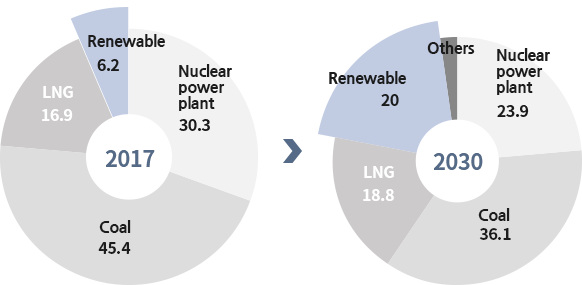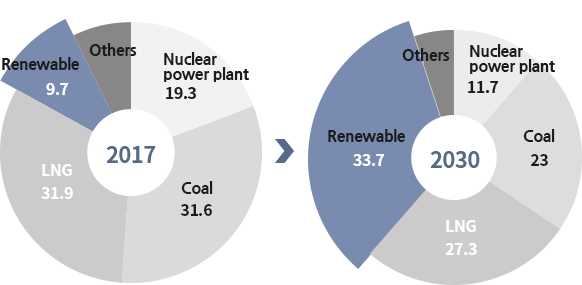KOGAS
Hydrogen, the Ultimate Eco-Friendly Energy
Hydrogen, which is the most abundant and lightest element in the universe, is a clean energy that can be made with water, and then becomes water again after use.
Characteristics of Hydrogen Energy by Numbers
-

- Abundant Hydrogen Energy
- Hydrogen, with atomic number 1, is so abundant that it comprises 75% of the mass of the universe. It is practically infinite in nature, combined with oxygen and carbon. It is also a universal energy source that can be conveniently accessed anywhere on the planet.
-

- Clean Hydrogen Energy
- When hydrogen generates energy, no pollutants such as fine dust are generated. In addition, it is an eco-friendly energy that emits only pure water as a by-product.
-

- Safe Hydrogen Energy
- Hydrogen bombs are made on a fundamentally different principle from hydrogen used as fuel. In addition, hydrogen has a molar mass of approximately 2 grams, which is the lightest on Earth, so it disperses very quickly in the event of a leak, reducing chance of explosion, thus making it safer than other fuel.
-

- 'Energy Carrier' Hydrogen Energy
- Since renewable energy supply is intermittent, power is unstable. Hydrogen energy compensates for this by cheaply and efficiently storing the surplus power from renewable energy. It therefore enables energy conversion in industries and transportation fields that require a stable energy supply.
Hydrogen, Achieving Stable Economic Growth
Korea currently imports 95% of its energy, so energy supply and demand are greatly affected by the international energy market. Conversely, when hydrogen energy is used, dependence on foreign energy is reduced, thereby stabilizing energy supply. In addition, the import of eco-friendly energy from overseas, which does not generate greenhouse gases, can be expected to facilitate stable economic growth by securing an industrial development engine that does not cause climate change.
Percentage of Power Generation and Facility Capacity by Energy Source in Korea
Power generation share
Facility capacity share
Hydrogen Share of Total Energy
5% of total energy
-
0.5%
2022
-
1.9%
2030
-
4.9%
2040
Hydrogen Energy Use
Hydrogen energy has been widely used for decades in petrochemicals, semiconductors, oil refining, food, aerospace, and other industries. It is currently being developed and distributed around the world for transportation and power generation.
-
petrochemical
-
semiconductor
-
essential oil
-
car
-
food
-
airline
-
universe




